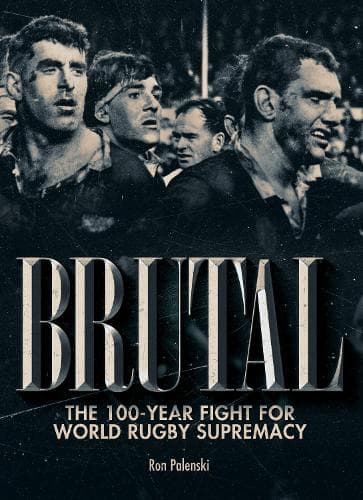Review: Brutal: The 100-fight for World Rugby Supremacy
Reviewed by Michael Burgess
When the All Blacks face the Springboks in 2021, it will mark a century since the two rugby nations first met. That’s a big deal – or is it?
Those Kiwis who grew up in the 1980s and beyond might wonder why there is such hype and reverence attached to fixtures between these two teams. To modern fans, Australia has become a much more regular adversary, with recognisable players that we love to hate, while since the turn of the century victories over England have become especially celebrated.
But dig a little deeper, go beyond the superficial context of today’s fast twitch news agenda, and you will find a rivalry almost unequalled across world sport. That’s the argument put forward by historian and writer Ron Palenski, in this highly impressive tome.
It’s a big claim, especially considering the competition and enmity generating from cricket (the “Ashes”’ or India versus Pakistan), rugby (Scotland or Wales versus England) and football (Brazil versus Argentina, Germany versus Holland etc), not to mention the wider basis that frames any sporting contest between the United States and Russia.
But for sheer and enduring impact, far beyond the fields of play and over such a sustained period, the rivalry between the All Blacks and Springboks is hard to top, as Brutal details superbly. From the 1920s to 1981, their clashes did stop two nations, and sometimes world sport, as more than 30 nations boycotted the 1976 Olympics because of New Zealand’s rugby engagement with South Africa earlier that year.
Palenski outlines the emergence of the sport in both countries, finding many parallels, and how they both quickly reached the top of the tree. Who knew, for example, that as early as 1907 British newspapers, including the Daily Mail, were calling for a “world championship game” in England between the All Blacks and the Springboks to decide global rugby supremacy?
The two teams didn’t clash for the first time until 1921, with Brutal tracing the rivalry and relationship since. But it’s far from formulaic, brought to life by Palenski’s unparalleled subject knowledge and obvious love of research.
There are delightful gems in every chapter. Jimmy Mills, the All-Black halfback of Ngāti Porou background, who couldn’t tour South Africa in 1928 (because he was Māori), ended up on the same boat that brought the touring Springboks from Sydney to Auckland in 1937, playing in a tennis tournament with them on board. What about the unlikely matchwinner in 1949, a South African prop who had learned the art of goal kicking in German POW camps? The book takes readers inside that pivotal – and gruelling tour – where the All Blacks spent eight nights from eleven on trains at one point, criss-crossing the Republic.
In the days before the sterile world of professional sport there are characters aplenty, the heroes of yesteryear, who are skilfully brought to life. Ahead of the 1960 tour one contender, who had been struggling with a broken finger across the previous season, decided to have the digit loped off rather than potentially missing games on the trip with another break. Another All Black struggled with (undiagnosed) appendicitis for several weeks on the 1970 tour, before getting it removed the day after the final test, finally succumbing to the agonising pain.
Palenski doesn’t avoid the harsher subject matter of racism and apartheid, always with a critical but balanced eye. In 1960, there was a staggering 153,000 signatures on a petition calling for a tour to South Africa to not go ahead – because of the mandated racial selection - but regular contact continued, against considerable odds, until 1981.
The concept of an “all white” All Blacks team is impossible to imagine now but it was a reality until 1970, with the book detailing how even some prominent figures in Maoridom agreed with the Rugby Union’s stance, given the apartheid scenario in South Africa.
The author has achieved a fine balance which should appeal on several levels. For the rugby fanatic, the insight, fresh research and love of the subject will resonate greatly; for the general sports fan, there is plenty to enjoy. But even for those who are perhaps indifferent about rugby, it could be highly engaging, as the characters, the historical buffet and the socio-political themes offer a much deeper read than a standard sports book.
Reviewed by Michael Burgess
